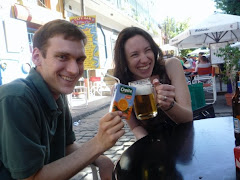The official description of the Life Skills Committee is that it is a group to assist PCVs and their Counterparts in promoting healthy lifestyles and organizing education activities related to healthy living by providing and creating resources, training PCVs and Counterparts and giving support and encouragement. One of the biggest topics the committee works on is promoting HIV/AIDS awareness and education in Georgia.
Life Skills has done some really cool projects. We revised and edited one of our biggest resources, the Life Skills Activity Book, which is nearly 200 pages of suggested activities to use for teaching various health topics, broken down by subject and available in English and Georgian (and soon to be in Russian, too). We write monthly newsletters that we send around to PCVs, PC Staff and forward on to a few health NGOs and community partners. In February each year, we plan, organize and facilitate a training on HIV/AIDS and other health topics, teaching PCVs and their CPs how to teach life skills in their communities.
The 2010 Life Skills Committee probably came close to breaking records on projects undertaken, though. One of the coolest and biggest project was what we called the Health Education Lecture Series and Companion Guide. For an incredibly small budget, we created this new DVD resource that presents Georgian doctors and other health specialists lecturing for about 10-15 minutes on various health topics in Georgian. Since Georgia has no formal health education in schools, there is a huge information gap and old wives tales rule the day in explaining health complaints or prescribing remedies. We conceived of the idea to film health professionals giving accurate, reliable information that could easily be shared to all regions of Georgia, and to supplement these lectures by creating lesson plans for leading post-video-viewing discussions, doing interactive activities or researching further. The lectures are arranged on a 12-month schedule, with each month assigned a corresponding topic. Usually these topics line up with some sort of international or national health topic holiday. For instance, March is "Women's Health" month in the series because March 8 is International Women's Day and March 3 is Mothers' Day in Georgia. Our topics include things like Women's and Men's Health, HIV/AIDS, Nutrition and Physical Fitness, Hygiene and Communicable Diseases and others. (If you're interested in seeing some of the videos, they're also available on YouTube here. They're in Georgian, but this link has Russian subtitles as well.) The Companion Guide, about 70-some pages long, is burned onto the DVD copies that we gave out to all the PCVs, and we're getting hard copies printed as well. We've made this resource available in Georgian, English and Russian so it's accessible to almost everyone in the country.
All this work was done by a fairly small group of highly motivated, dedicated volunteers and PC staff members, whom I'm very fortunate and lucky to know and work with. Our committee has four permanent members and a PC Staff liaison. Funnily enough, all four of us PCVs during the last year were married women, so one staff member referred to us as the "married wives" committee. Now that the G9 volunteers are back in the States readjusting and moving past Peace Corps, it's just two of us (plus our fantastic alternate member!) working on the committee until the November election of new members at the All Volunteer Conference. We're looking forward to getting some new members, both to help us fill the big shoes our fantastic G9 members left vacant and to get some of the G11s involved.
We already have some plans for projects to work on in the coming year, but our big focus coming up is going to be on preparing for February's training. Lots of work lies ahead, but I've been thrilled to be keeping myself so busy and to get to work on so many projects, the impact of which can be seen so quickly.




No comments:
Post a Comment